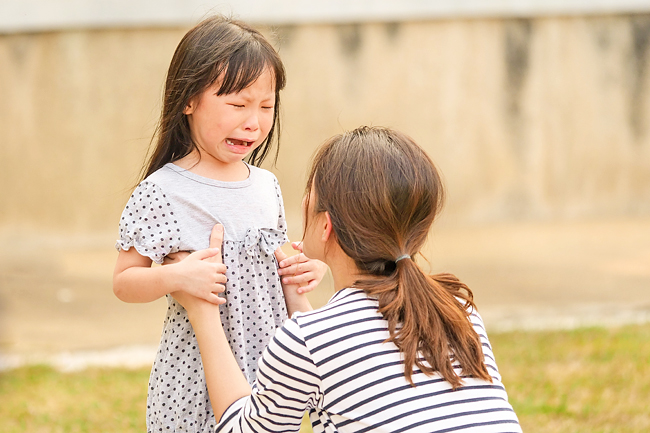Leo Sands
THE WASHINGTON POST – Picture the scene: You’re exhausted after a long day, you’ve barely had time to shower, and you’re trying to get through dinner with your family. Then your 12-month-old holds out their spoon, looks you in the eye and drops it to the ground. For the third time. As their parent, how should you respond?
By shutting them in their room, said the ultra-strict French child psychologist Caroline Goldman who argues that one-year-olds are mature enough to be punished with timeout.
Her parenting advice might sound extreme to American ears, or anyone who believes a one-year-old does not have the motor skills to grasp a spoon in their hands for an entire meal, let alone the intellectual capacity to understand the concept of punishment.
But in France, Goldman’s high-profile advocacy for parents to punish their young children for seemingly minor infractions has attracted a mixture of shock, support and fascination.
Her popular parenting podcast has been listened to 1.8 million times since its launch, propelling the series to the coveted number one overall spot on Apple Podcast’s ranking for all categories in France, its producer said.



Goldman, 47, is using the platform to deliver parenting advice that is controversial even in France, where caregivers are generally considered stricter than in many other Western countries.
The moment an infant is old enough to “look at his parent showing an awareness of having broken the rules, then he is asking for a punishment, and he is ready for it”, Goldman said in an interview. She said this developmental stage is usually reached by around 12 months, an age at which not many babies can speak more than a few words.
Goldman, a mother of four, describes her methods as a correction against the overly permissive attitude she said she has observed increasingly among other parents.
She is dismissive of the “gentle parenting” approach, which emphasises communication, care and empathy when disciplining a child, that has grown in popularity in the United States and elsewhere.
Children, she said, should be made to understand that they cannot say whatever they feel, speak too loudly or spill their food deliberately.
French parents are paying too much attention to gentler parenting methods, Goldman contends, and becoming too lax as a result. Her stated goal is simple: the restoration of hierarchy in the parent-child relationship.
“Without order, no peace can exist,” Goldman said, suggesting that gentle parenting approaches frequently “recommend responses that are disconnected from reality, ineffective or even incoherent, such as offering a child a hug in the midst of a fight”.
The list of transgressions that merit punishment, according to Goldman, includes: talking too much, talking too loudly, making too much noise, shouting, complaining over nothing, complaining over everything, refusing to say hello, refusing to say thank you and general emotional overreaction. Parents should begin phasing out these transgressions, Goldman writes in her 2020 book, Go To Your Room, starting at the age of one.
Goldman opposes hitting or deliberately humiliating your child if they break these rules.
Instead, her go-to punishment is the timeout method, and her instructions are precise: Clearly explain to your one-year-old what they have done wrong three times, she advises.
If they do not stop doing it, place them in a secure room – ideally a bedroom – for between one and two minutes.
As they grow older, she suggests increasing the amount of time they are shut in their room according to the gravity of their misdeed.
Do not let them out early if you hear them cry, sniffle or call for you, she instructs.
Communicate to them what they have done wrong, but do not engage in a dialogue or show your own emotions, she said.
Goldman admits that there is inadequate scientific research on the emotional impact of using the timeout method on children as young as one. In the case of her clients’ children as well as her own, however, she said the method works. She points to an American study published in 2020 that concluded no “long-term negative outcomes” were associated with the use of timeouts at the age of three.
Many in France agree that parents have become too gentle and have welcomed her high-profile advocacy of tougher punishments.
“In the past few years, the child has become the eighth wonder of the world, at the centre of the extreme attention of their parents who never let them go,” psychoanalyst Jean Plissonneau wrote in a defence of Goldman’s methods published in the French newspaper Le Monde in March.
Her adherents describe her approach as a common-sense and effective alternative to the “child-centred” strategies that are otherwise growing in popularity.
“I am a mother of four children as well as an elementary school teacher and I applaud you, because of course you are right!” one reader commented below a March interview Goldman gave to Le Point.
“Children need limits,” another said. “Parents who follow these lax ideas that nothing should be banned are doing them a disservice.”
But her methods have also drawn criticism that is equally fierce. In March, 280 psychologists, doctors and child development experts denounced Goldman’s use of the timeout method as coercive, ineffective and counterproductive in an open letter published in Le Monde. “It’s really violent,” said child psychologist Héloïse Junier, one of the signatories, who said that sending a child to their room at such a young age is authoritarian and cruel and undermines their dignity.
“This practice is an excellent illustration of ‘ageism,'” Junier said.
“The tendency that we as adults have to do things to children that we would not do to other adults, such as forcing them to finish their food, isolating them in their room when they’ve broken a rule, or forcing them to kiss adults on the cheek when greeting them.”
Defenders of gentle parenting argue that, rather than being permissive, they are being authoritative and that focussing on helping a child regulate and understand their feelings while maintaining boundaries and educating rather than punishing them is more effective and beneficial – for both parent and child – in the long term. The goal is to help a child learn how their actions have hurt others and not just make them feel bad about themselves.
Popular American parenting gurus, like Becky Kennedy, have also argued that building a strong connection with your child is a more effective strategy for changing behaviour than implementing punishments.
Some critics of Goldman’s methods also said she has gained traction in France because so many journalists and parenting experts were themselves raised by strict parents – which could mean the latest generation of parents is also being shaped by and reacting to its own childhood experiences.
“France is a conservative and traditional country,” Junier said. “Many French people tend to replicate the parenting styles they have themselves received, without questioning.”




